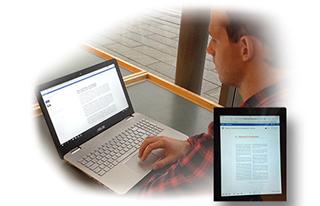Course literature
The library acquires the literature required for all the courses available at the university. According to the library's acquisition policy electronic books are preferred to printed editions.

Printed course literature
The library has the books required for all the courses available at the university. The number of copies purchased depends on the demand and the number of students in the course.
Course reference books
The library holds a reference collection of the most popular course books. Course Reference books have special loan conditions and are located in a separate room.
E-books
Some course literature can be found as an e-book and according to the library's acquisition policy, e-books are preferred to printed editions. E-books can be read online (even outside the campus) and they can often be downloaded to a computer or tablet, but different vendors may have different terms of use.
If the book is available electronically, we try to buy a multi-user license, so that all students and employees have the opportunity to access the book. If there is no such license, or it is too expensive, we contact the teacher to discuss whether a 1- or 3-user license works or if it is better to buy printed books.
However, not all publishers sell literature that is classified as a textbook as an e-book to libraries, but only directly to students or faculties. This applies to several Swedish publishers, among others. They can also sell it via a pricing model that involves very high annual costs and in these cases it may be impossible for the library to obtain the book in electronic format. This is more common among large international publishers.
Articles
When (scientific) articles are included as course literature, it is good if the teachers first check that the journal is either subscribed to by the library, or that it is an open-access journal.
Open educational resources
An alternative to licensed material can be to use open scientific material from eg Swepub or DiVA. Open educational resources can also be other types of books, articles or courses with digital content. They have the advantage that everyone can use them free of charge and that they are always available. These books can often not be purchased in printed format by the library, instead you link to the electronic edition.
There are several services for finding open scientific material, but much is also activated in the library's search service OneSearch.
Talking books
Students with reading disability, can borrow talking books and listen to the course literature. The student does not need a certificate, but they must make it likely that they have a reading disability. The student get access to talking books by contacting the library's contact persons
Purchasing suggestions and acquisition policy
As a teacher you can purchasing suggestions of books and e-books.
The library’s holdings shall reflect the teaching and research conducted at the University.

